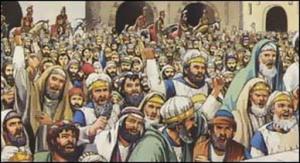
The “Stories of Jesus” series continues with Part Two, the Miracles. This post looks briefly back at what has been attempted in posts on the Nativity Stories and ahead to posts on Jesus’ miracles. Before that I include a Table of Contents with links to previous posts in the series. The Contents will expand with new entries for each new post.
Table of Contents
- Getting Acquainted with the Historical Jesus and Getting to Know about God
- History and the Historical Jesus
- The Quest of the Historical Jesus
- Infancy Stories in Matthew and Luke: Credible History?
- The Story of the Magi and Biblical Historical Criticism
- The Impossible Becoming Possible and Stories of the Christ Child
- Stories of Jesus: Intro to Part Two, the Miracles (below)
- Bible Criticism and Jesus the Miracle Worker
- Miracle Stories, Science, and the Humanity of Jesus
- Metaphors and Transcendence: Miracles and God’s Relation to the World
- Power to the Powerless: Miracles and the Way of the World
- Miracles and the Ways of God
- Part Three, From Temptation to Cross: The Temptation in the Desert
- John the Baptist Mentors Jesus until they Part Ways
- Adultery and a Story of Jesus Writing on the Ground
- The Unbrokered Kingdom and Jesus’ Wandering Ways
- The Beatitudes: Blessed are We Poor
- Unsuccessful Prophet: Jesus Fails to Win His Own
- Misunderstood Messiah: Jesus’ Friends don’t Get It
- Faith that can Move Mountains … or Not
Stories of Jesus: Looking Back
Divinity entered history, but not so obviously on that first Christmas that you would have known it. We have amazing events, miracles, surrounding Jesus’ birth, as told in the Gospels of Matthew and Luke. But we have pretty good reasons to think of these as symbolic representations of facts and truths to come later in the stories. That’s what Bible scholars like Raymond Brown conclude.
Previous post in the “Stories of Jesus” series, for example this one, advocate thinking of these stories as a kind of historical fiction. I can see in them a symbol of my present world and its impossible possibilities, rather than an account of some impossible things that happened long ago.
Looking Ahead: The problem of miracles
Jesus’ birth did not register with supernatural power on the seismograph of history. If that is true for the circumstances of Jesus’ birth, what about Jesus’ later career? Do Jesus’ many miracles make any ripples in the time-space continuum that a sensitive instrument would have caught? Do they prove that God exists? The history surrounding Jesus’ birth, as opposed to the Gospel stories, offers no proof of Jesus’ divinity. That’s the claim of previous posts in this series. Does the history behind the miracle stories perform that task any better?
I want to believe that, in the case of Jesus’ miracles as well, divinity does not enter obviously into human history. That is my admitted beginning bias. The “Stories of Jesus” series continues with the problem, for me, of Jesus’ miracles.
An atheist’s argument
On the internet you can run across many criticisms of Christianity. Some of them are worth paying attention to, for instance, the following criticism of Jesus as worker of miracles:
So, Jesus was God, and he performed miracles. If Jesus actually cared about people, why did he cure so few? He could have cured every sick person in Palestine, every sick person the world over even up to today. Why didn’t he? Why doesn’t he?
It took a while for this criticism to sink in. I was accustomed to thinking of Jesus as doing one big thing, saving the world from sin and ultimately death. The miracles seemed like useful sideshows. They proved to those inclined to doubt that Jesus was God or, at least, that there was a God and God was working with Jesus. They showed that Jesus was someone who cared about our bodies and our souls. They gave us a few representative examples of caring so we would go and do what we could. Jesus was a man with special powers. If he didn’t choose to use them as much as he might have, he did have a bigger task ahead.
The suffering of the world, especially undeserved and extreme suffering, keeps many people from believing in God. Is suffering in this world really a sideshow, even for Jesus? To put the question another way, is salvation just about leaving this world of woe and going to heaven? To hear some Christians talk, that’s exactly what it is; and I suspect that’s also a major reason why some very good people turn away from Christianity.
The Kingdom in this world
A careful reading of the gospels shows that, in Jesus’ mind, salvation is about this world before it’s about the next. Jesus of the Gospels has little to say about another world but a lot to say about this world. He proclaims God’s kingdom’s arrival in this world. Concern for the poor and suffering could never be for Jesus a sideshow. Miracles never were just proof of God’s existence or that we should listen to what Jesus has to say. So the atheist’s question is reasonable: Why did Jesus leave so many people uncured–sick, crippled, and possessed by demons?
The question assumes that Jesus could have gone ahead and cured everyone if he had wanted to. I think that assumption is shared by most Christians. The miracle stories in the Bible—there are quite a few, after all—seem to bear that out. But it’s a question that needs investigating. What did Jesus think was going on whenever he worked a miracle? What did other people think? What would you and I have seen if we had been there? Why are the miracle stories in the Bible? I need to take a closer look at the miracle stories.
Image credit: The Christian Broadcasting Network via Google Images












